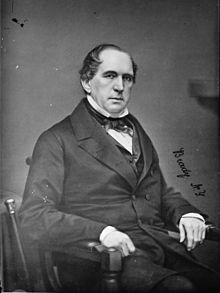Erastus Corning (politician, 1794)
Erastus Corning (born December 14, 1794 in Norwich , Connecticut , † April 9, 1872 in Albany , New York ) was an American businessman and politician . Between 1857 and 1859 and again from 1861 to 1863 he represented the state of New York in the US House of Representatives .
Career
In 1807, Erastus Corning moved to Troy, New York State, where he worked in his uncle's hardware store. From 1814 he lived in Albany, where he also worked in the hardware store. Soon he took over a company that he with his uncle to Erastus Corning Co. united. Their business went far beyond a normal iron trade. He sold stoves and agricultural utensils. In Albany he ran a shipyard on the Hudson River . His company also supplied other companies in neighboring cities. In addition, Conkling entered the banking and insurance industries. He was President of Albany State Bank from 1834 until his death . Eventually he expanded his business interests to include the railroad business. He became a board member and president of several railway companies. In 1853 he founded the New York Central Railroad out of ten railway companies . He remained president of this society until 1865, which was taken over by Cornelius Vanderbilt in 1867 . Corning was also involved in other railroad projects in other states such as Wisconsin , Iowa, and Michigan .
At the same time he embarked on a political career as a member of the Democratic Party . He initially sat on the Albany City Council; between 1834 and 1837 he was also mayor there. From 1842 to 1845 he was a member of the New York Senate , where he campaigned for the further expansion of the railway network. In the congressional elections of 1856 he was elected to the US House of Representatives in Washington, DC in the 14th Congressional constituency of New York , where he succeeded Samuel Dickson on March 4, 1857 . Since he was not confirmed in 1858, he could initially only complete one legislative period in Congress until March 3, 1859 . This was shaped by the events leading up to the civil war .
In the spring of 1861, Corning was a member of a negotiating committee that unsuccessfully sought to prevent the outbreak of civil war in the federal capital, Washington. In the congressional elections of 1860 he was re-elected to Congress in the 14th District, where he replaced John Hazard Reynolds on March 4, 1861 , who had been his successor there two years earlier. After being re-elected, he could remain in the US House of Representatives until his resignation on October 5, 1863. His resignation took place for health reasons, but also because of his criticism of the progress of the civil war. He originally supported President Abraham Lincoln's policies . But then he became dissatisfied with his war strategy. In 1863 he ran for the US Senate , but was defeated by Republican Edwin D. Morgan .
After his tenure in the US House of Representatives, Erastus Corning continued his business activities. In 1867 he took part in a constitutional convention of his state as a delegate. After that, he gradually withdrew from some lines of business. To this end, he was more involved than before in the real estate business with land speculation. He died on April 9, 1872 in Albany, where he was also buried. Erastus Corning was the grandfather of Congressman Parker Corning (1874-1943) and New York Vice-Governor Edwin Corning (1883-1934). His grandson of the same name Erastus Corning (1909-1983) was Mayor of Albany and State Senator in New York.
Web links
- Erastus Corning in the Biographical Directory of the United States Congress (English)
- Biography (English)
| predecessor | Office | successor |
|---|---|---|
| Samuel Dickson |
United States House Representative for New York (14th constituency) March 4, 1857 - March 3, 1859 |
John Hazard Reynolds |
| John Hazard Reynolds | United States House Representative for New York (14th constituency) March 4, 1861 - October 5, 1863 |
John VL Pruyn |
| personal data | |
|---|---|
| SURNAME | Corning, Erastus |
| BRIEF DESCRIPTION | American entrepreneur and politician |
| DATE OF BIRTH | December 14, 1794 |
| PLACE OF BIRTH | Norwich , Connecticut |
| DATE OF DEATH | April 9, 1872 |
| Place of death | Albany , New York |

